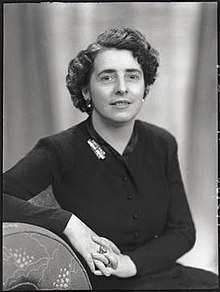Margaret McKay
Margaret McKay (née McCarthy; 22 January 1907 – 1 March 1996) was a British Labour Party Member of Parliament for Clapham from 1964 to 1970.
Margaret McKay | |
|---|---|
 | |
| Member of Parliament for Clapham | |
| In office 15 October 1964 – 17 June 1970 | |
| Prime Minister | Harold Wilson |
| Preceded by | Alan Glyn |
| Succeeded by | William Shelton |
| Personal details | |
| Born | Margaret McCarthy 22 January 1907 Oswaldtwistle, Lancashire |
| Died | 1 March 1996 (aged 89) |
| Political party | Labour |
Early life
Despite later assertions that McKay was born in 1911, she was in fact born on 22 January 1907 at Oswaldtwistle, Lancashire, a daughter of Joseph and Betsy Ann (Catlow) McCarthy.[1]
Career
McKay's family moved to New Bedford, Massachusetts in her youth, but then returned to England. McKay joined the Independent Labour Party's Guild of Youth, then the Young Communist League, graduating to the Communist Party of Great Britain. She left the party in 1932, joining the Labour Party,[2] and became active in the Socialist League, a left-wing pressure group within the party, serving as its general secretary from 1936 until it was dissolved the following year.[3] She also became general secretary of the National Union of Domestic Workers, a national organiser for the Transport and General Workers' Union, and Trades Union Congress Women's Officer (1951–1962).[4]
After holding various trade union posts, McKay stood unsuccessfully for Labour in Walthamstow East at the 1959 general election.[2] At the 1964 general election, she defeated the sitting Conservative MP Alan Glyn for Clapham, taking the seat with a majority of only 556.[5] At the 1966 election she increased her majority to over 4,000 against the Conservative Ian Gow,[6] but she stood down at the 1970 general election, when the seat was won by the Conservative William Shelton.[7]
While in Parliament, McKay became a supporter of Arab interests, creating a mock Palestinian refugee camp in Parliament Square and wearing Arab robes during debates. Jordan issued a postage stamp in her honour. After retiring from politics, McKay moved to Abu Dhabi.[2] She became a friend of the then President, Sheikh Zayed, and died there on 1 March 1996. She is buried at Sas Al Nakhl cemetery.
References
- Edward J. Davies, "The Parentages of Edward Whittle and Margaret McKay", North West Labour History, 38(2013-14):43.
- Oxford Dictionary of National Biography
- Michael Bor, The Socialist League in the 1930s, p.91
- Report of Annual Trades Union Congress. Trades Union Congress. 1996.
- Not updated: UK General Election results: October 1964
- Not updated: UK General Election results: March 1966
- Not updated: UK General Election results 1970
Further reading
- Margaret McCarthy, Generation in Revolt, Heinemann, 1953
External links
- Obituary by Tam Dalyell (The Independent)
- Hansard 1803–2005: contributions in Parliament by Margaret McKay
| Parliament of the United Kingdom | ||
|---|---|---|
| Preceded by Alan Glyn |
Member of Parliament for Clapham 1964–1970 |
Succeeded by William Shelton |
| Party political offices | ||
| Preceded by J. T. Murphy |
General Secretary of the Socialist League 1936–1937 |
Succeeded by Position abolished |
| Trade union offices | ||
| Preceded by Nancy Adam |
Woman Officer of the Trades Union Congress 1951–1962 |
Succeeded by Ethel Chipchase |